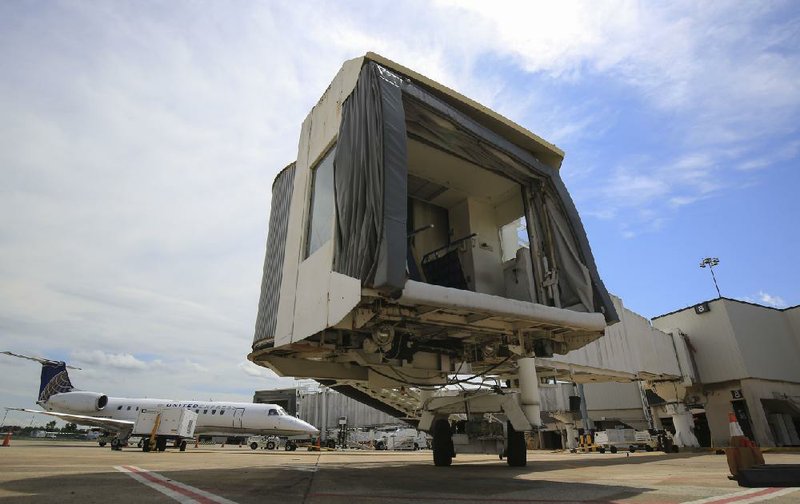Bill and Hillary Clinton National Airport/Adams Field is set to replace its 12 aging passenger boarding bridges by initially targeting the five oldest on the concourse for replacement, a proposition that is estimated to cost nearly $4.4 million.
A proposal to purchase five new ones received initial approval last week from the Little Rock Municipal Airport Commission's lease committee. It's up for final approval Tuesday at the commission's monthly meeting.
The bridges allow passengers to avoid being exposed to the weather as they board and exit most planes used by the airlines serving the state's largest airport. The bridges also make it easier for people with disabilities to transit between aircraft and the concourse.
Replacing the bridges is part of a larger project to upgrade the airport concourse, which now has a dozen gates.
"As part of the $20 million in concourse renovation, the heart of the program, or a significant part of the program, was replacing the jet bridges," said Bryan Malinowski, the deputy executive director at Clinton National.
Some of the existing passenger boarding bridges are between 30 and 40 years old, according to Tom Clarke, the airport's properties, planning and development director.
The bridges also were manufactured by a mix of companies, making parts replacement and maintenance logistically difficult, airport officials say.
Another reason to replace the bridges is to consolidate airport ownership and, thus, management of the gates, they said.
Ownership of the bridges now is divided among the airport and four airlines, according to Shane Carter, the spokesman at Clinton National.
The bridges at Gates 1 and 3, which are the oldest and in line to be replaced first, are owned by American Airlines. American also owns the bridge at Gate 8.
Delta Air Lines owns the bridges at Gates 2 and 4, United Airlines owns the bridge at Gate 7, and Southwest Airlines owns the bridges at Gates 10 and 11.
The airport, meanwhile, owns the bridges at Gates 5, 6, 8, 9 and 12.
Gates 6, 9 and 12 are identified by the airport as "common-use" gates, which allow "all the airlines operating at [Clinton National] to use the ... gates from time to time as operational need dictates," Carter said in an email.
Gate 6 now is primarily used by Delta and Fly Glo Airlines, Gate 8 by American and United and Gate 12 by United and Allegiant Air, he said.
Clinton National's proposal to purchase new bridges would replace the ones at Gates 1, 3, 5, 7 and 8. The first four gates are along the east side of the concourse. Gate 8 is in the rotunda at the end of the concourse.
"We had a company assist us and evaluate those bridges, and those along the east side of the concourse are the oldest and the most in need of replacement the soonest," Malinowski said.
Once the new bridges are procured and installed, the airport will own most of the bridges, except for the two at the Delta gates and the two at the Southwest gates, Carter said.
Three companies responded to the airport's solicitations for proposals to replace the bridges. They included the winning proposal from JBT Aerotech of Ogden, Utah, which bills itself as a "leading technology solutions provider for the air transportation industries."
The company also manufactures cargo loaders and transporters, tractors used to tow aircraft and aircraft de-icers, as well as specialized equipment for military aircraft and air bases.
The other companies submitting proposals were Thyssen Krupp Airport Systems Inc. of Fort Worth and Ameribridge LLC of Indianapolis.
Airport staff members evaluated the proposals under a "best value" score in which weights were assigned to different categories.
"Price was 30 percent, the schedule of the bridges was another percentage," Malinowski said. "We even had the worst bridges, Gate 1 and 3, first. There were other things in the proposal: the cost of replacement parts, the cost of maintenance, the cost of additional bridges in the next three or four years that they had to guarantee. They all had weights, as well.
"Ultimately, that added up to so many points. Whoever had the most points, won."
The final contract price of $4,380,850 includes a 15 percent contingency. The project is expected to take 270 calendar days to complete once a notice-to-proceed order is issued, airport staff members said.
Metro on 05/16/2016
